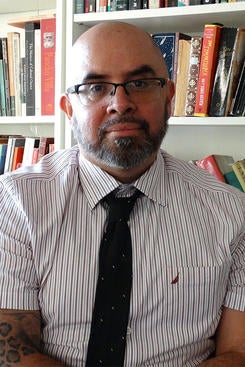
Message from the Director
Our logo is inspired by the ollin in Nahuatl, a Mesoamerican symbol for movement and seismic change. This symbol is a universal symbol for change in Mesoamerican knowledge systems and variations of it exist in Nahuatl, Quiche, Kanjobal, and other languages. This symbol is found at the center of the “Aztec Calendar” and it is a concept at the center of the universe in Mesoamerican philosophy. We have adopted this logo because it symbolizes the philosophical grounding of the Center in an approach to research that embraces change. Indeed, this change is at the center of our decision to create a Center for Latino and Latin American Studies, because we recognize that the material conditions facing Latino communities in our region require us to broaden the scope of our scholarly attention toward an ever more transnational and hemispheric mode of analysis that negates traditional approaches to Chicano Studies and Latin American Studies.
We seek to rescue the critical intellectual ethos that was at the heart of Chicano Studies programs in the 1960s, but we also recognize that as the material reality facing Mexican, Central American, and other Latino communities change, this too requires a transformation in the paradigm we use to study said communities. Hence, we hope to transcend the ethnic, national, and geographic focus of traditional Chicano Studies paradigms with its immediate geographic focus on the Southwest and the imperial impulse of Cold War-era Latin American Studies that emerged to serve the interests of an imperial state project. Though we embrace change, we seek to rescue the razón de ser of those early Chicano Studies programs, which were based on a critical intellectual ethos that supported the social change and community empowerment.
Indeed, we recognize that the last 40 years of neoliberal globalization have reconfigured the landscape in which Latino communities engage the social world and that therefore, we must reconfigure how we advance the project of critical inquiry. Thus, we seek a hemispheric and bilingual approach to research on and with Latino communities in the United States and in Latin America that sees these diverse communities as a broader social totality that require us to transcend 20th Century Chicano Studies and Latin American Studies paradigms. We boldly move forward with an approach to research and dialogue on and with Latino communities in the US, especially the Mexican origin and Central American communities in the Inland region, from a hemispheric perspective without losing the critical intellectual ethos of the early Chicano Studies programs that were grounded in communities and that sought social change.
— Alfonso Gonzales Toribio, Jurupa Valley Ca, 2-22-21
